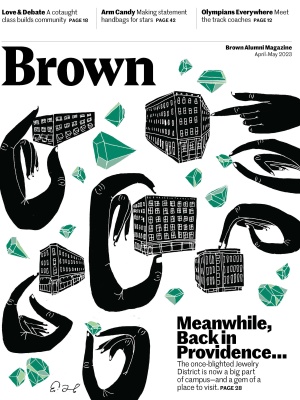Love & Joy
A course on African American culture cotaught by Professor Tricia Rose ’87 AM, ’93 PhD, and Professor Andre Willis—whose vigorous debates are part of their happy marriage—serves as a model for antiracism and radical love.
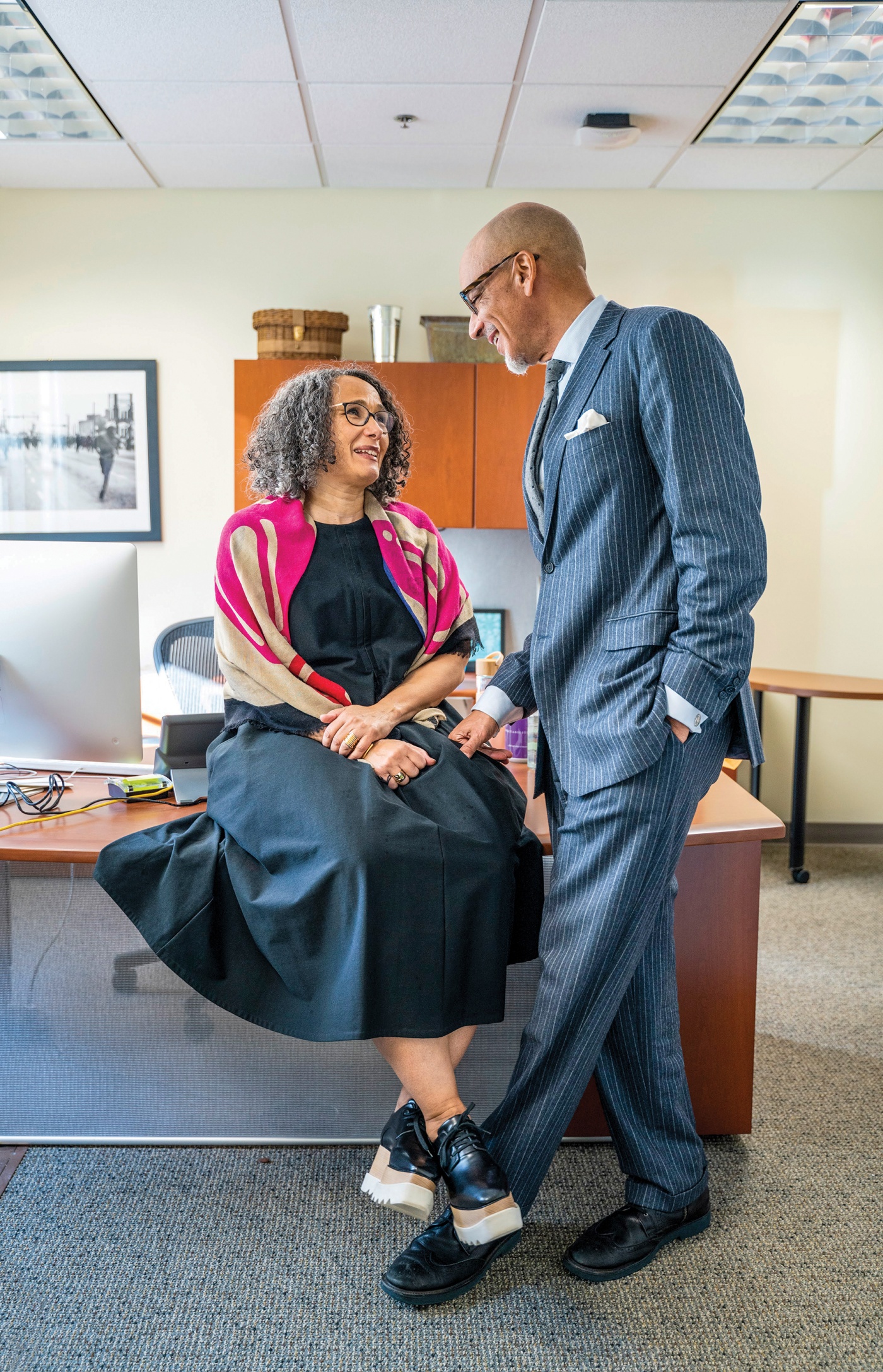
I’m from Homewood, Pittsburgh: place of my birth, place of my first kiss with Professor Rose—ain’t that right Professor Rose?”
These are the first words I hear when I enter the ZoomRoom. My laptop is curled into a nest of blankets on the bed, and yet Professor Andre Willis’s trademark velvet drawl immediately transports me back to aisle nine of the first-floor auditorium in Smith-Buonanno Hall. It was in that seat seven semesters earlier, as a naive but eager first-year determined to “get her Black education,” that I first encountered the magic of Blues People: Issues & Debates in African American Religion and Culture. Four years and a whole pandemic later, I am delighted and comforted to see that little has changed.
“True, true,” Dr. Tricia Rose ultimately concedes, laughing, “Can’t lie about that.”
“All right, let’s jump right in,” Willis says, now addressing one of the religious studies TAs as the number of tiny boxes populating the screen seems to multiply exponentially. “We got 109 with us now, Donnell. You think that’s enough to kick it?”
Blues People was offered for only the second time in Spring 2021, but already the course had garnered a reputation for the breadth of topics covered and its unconventional format. As the syllabus makes clear with the italicized font of its opening line, “This is not a course on blues music.” Rather, it is a course that examines key issues and debates among and about
African Americans that “revolve around an enduring question: What characterizes Black life and how have African Americans responded?” In other words, what makes Black culture Black? Or still more difficult to answer: what makes it culture?
The professors go on to explain that the course is named for a keystone book in African American studies. Amiri Baraka’s Blues People sets out to answer questions of Black identity through reflection on “the legacies of oppression and manipulation that mark Black history, and the rich cultural traditions developed under these conditions.” Willis and Rose’s Blues People is an attempt to do the same—one that waxes socratic rather than didactic by grounding their inquiry in the practice of debate.
“You have to figure out how to take people where they are, challenge them, hold yourself to certain standards, but acknowledge we’re going to have different points of view and that similarity is not going to be the basis for community—if it is, there won't be any.”
As a first-semester student in fall 2017, I was too young to appreciate the rarity of the cotaught classroom, at Brown and in academia more broadly. Rarer still is the combination of fate and talent that allows a married couple to coteach. Blues People is the only such at Brown.
“There aren’t too many partner-based courses out there, and certainly not very many Black ones, because it’s extremely uncommon to have [Black] couples who are both college professors also working in the same place,” explains Rose, the Chancellor’s Professor of Africana Studies and director of the Center for the Study of Race and Ethnicity in America. At Brown, cotaught classes often necessitate that professors reside in different departments in order to lend an interdisciplinary approach to the coursework; Willis is a professor of religious studies, while Rose is a sociologist who pioneered research on hip hop. And for a topic as delicate and unwieldy as Blackness in America, in an era as politically tenuous as this one, the ability to perceive questions through entirely different frameworks proved not only fruitful but essential.
“The reason why we thought about this course when we did was that we wanted to figure out how can people—not just intimate partners, but people who see themselves as part of a chosen community—vociferously disagree? And how can you stay connected to people in those territories of disagreement?” Rose asks. “Because really that’s what community’s going to require. You have to figure out how to take people where they are, challenge them, hold yourself to certain standards, but acknowledge that we’re going to have different points of view and that similarity is not going to be the basis for community—if it is, there won’t be any.”
In the neighboring Zoom box (both professors join the class from their respective offices to avoid “getting all up in each other’s space”), Willis nods emphatically, adding that their different academic traditions and specialties enable them to address a range of daunting questions with nuance and assiduity.
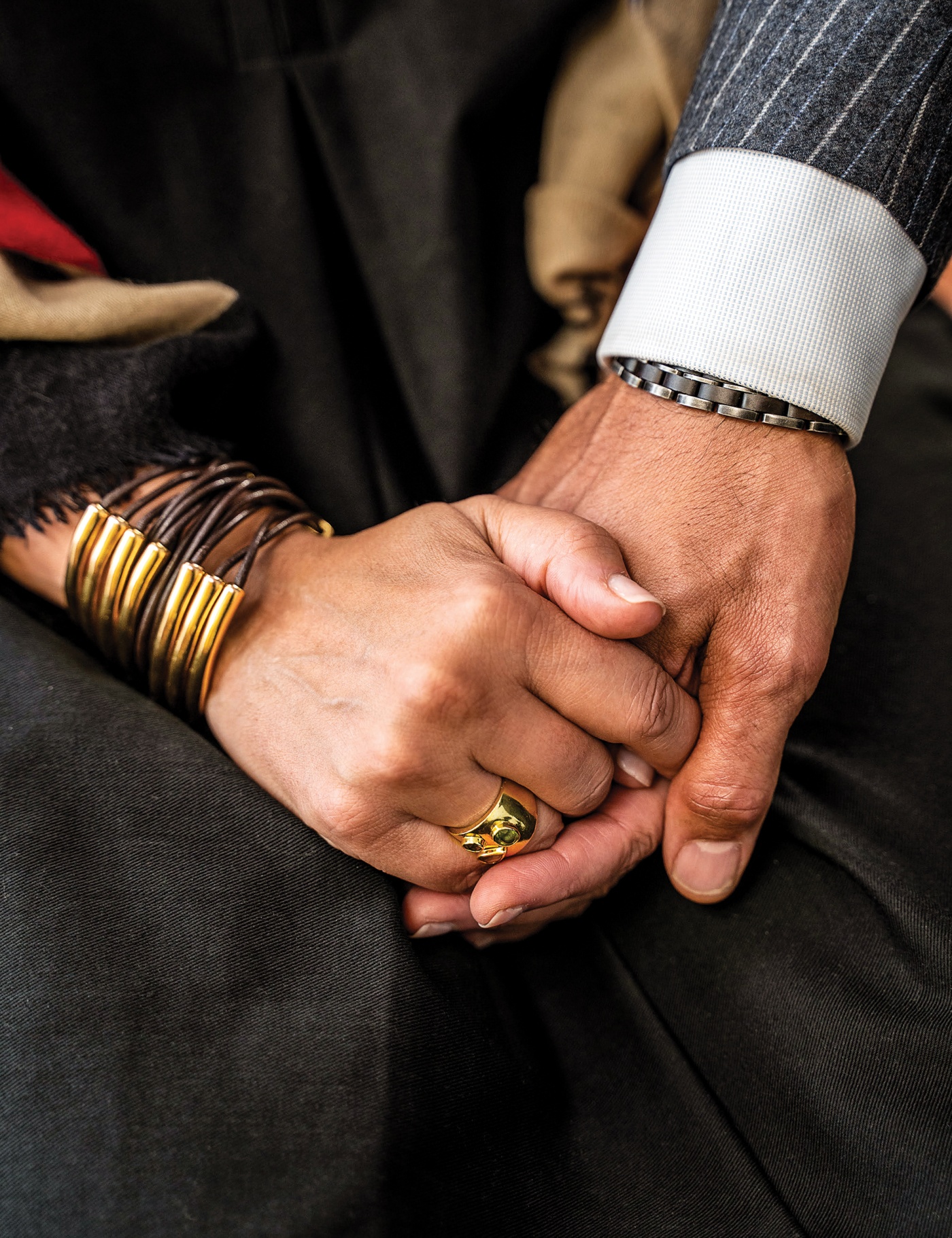
“We really wanted a class where we tackled the big issues that were at the heart of thinking about Black life when we were younger,” says Rose, jumping back in. “It’s gotten so elaborate intellectually that it’s hard to remember what the core of some of these issues are for everyday people, when we were in the barbershops and beauty salons debating.”
Despite the goal of getting back to the basics, the course’s workload is significant, regularly requiring students to consume a foundation of two books a week, supplemented by films, essays, articles, and other academic and cultural content. Authors range from novelist James Baldwin to intersectional revolutionaries like Audre Lorde, and weekly journal entries ensured that the material was not merely read but thoroughly digested, fuel for the high-powered intellectual discourse of the upcoming class.
“I feel like you could go back to [a debate from] any week and write a book on it, and people have! Seeing writers from different generations, different positionalities, socioeconomic statuses, all take on the same issues, it made me realize that I don’t have to have one decided opinion on certain topics,” said Osayuwamen (“Uwa”) Ede-Osifo ’22, an international and public affairs concentrator. “Rather than my ideas challenging or reaffirming [existing viewpoints], I began to think about hybrids. Perhaps like this hypothetical argument that has been in the more conservative-moderate camp of African Americans can be spun in different ways, or the rhetoric can be changed to still address important issues, but not create the same level of division and turmoil within our communities.”
Though at times dense and webby, the material provides fertile soil for probing questions to put down roots and rousing debate to flourish. Conventional essays were replaced by a series of reflection papers, an intimate but equally demanding writing requirement of 10-12 pages at several checkpoints throughout the semester. I distinctly remember toiling over the papers as early as the brainstorming phase, turning over in my mind various arguments that supported or opposed complex sociocultural phenomena. The course demands balance, and as a result my arguments were each tenderly and painstakingly handcrafted, seeking a harmony among extremes that can only be achieved by carefully teasing out the intricacies of various scholarly stances and the lived experiences that produced them.
“We really wanted [to] tackle the big issues that were at the heart of thinking about Black life when we were younger. It’s gotten so elaborate intellectually that it’s hard to remember what the core of some of these issues are for everyday people, when we were in the barbershops and beauty salons debating.”
“There was one particular week about how there need not always be writing about Black suffering, and it was conflicting ’cause I feel like that’s such an important chain and struggle within the Black community,” Ede-Osifo explained. “But this author made a pretty good point about how our experiences should not be reduced to the pain we’ve experienced, or to this trauma porn within the Black community.”
“In the past, white people have been the audience for these conversations, but there are ways we can have this conversation that don’t need to include white people,” she continued. “The class has given me a blueprint for beginning and continuing conversations with people on these issues and thinking about how we’re all working towards the same goal of Blackness that is not defined in contrast to white oppression, while also grappling with the very real implications of white oppression on the Black identity.”
A sample of potential debate topics includes questions like “Can Blackness exist without whiteness?”; “Is African American culture distinctive or derivative?”; and “Does African American culture support or resist white supremacy?” On this particular day, however, class opens with a reflection on Black love that will prove to be deeply symbolic.
“What Black folks have brought to the world is an understanding of love that adds to the Greek conceptions of love, right?” Willis says, beginning the brief lecture that always precedes a subsequent debate. It is the laying of context for what will follow, an imperative setting of stage.
“The Greeks have bequeathed to us three concepts of love: eros, erotic love; philia, brotherly love; and agape, neighbor love,” he continues, “and what I think Black folks have uniquely brought to the modern world is a different way to love: love as self-revealing. To reveal yourself as a Black person is a way of self-assertion, and this has been instantiated in the best of our expressive traditions because we have something to reveal that’s very unique in terms of agents in the modern world—as cultural workers, so to speak. This ties into that lecture on Du Bois that I never got to finishing….”
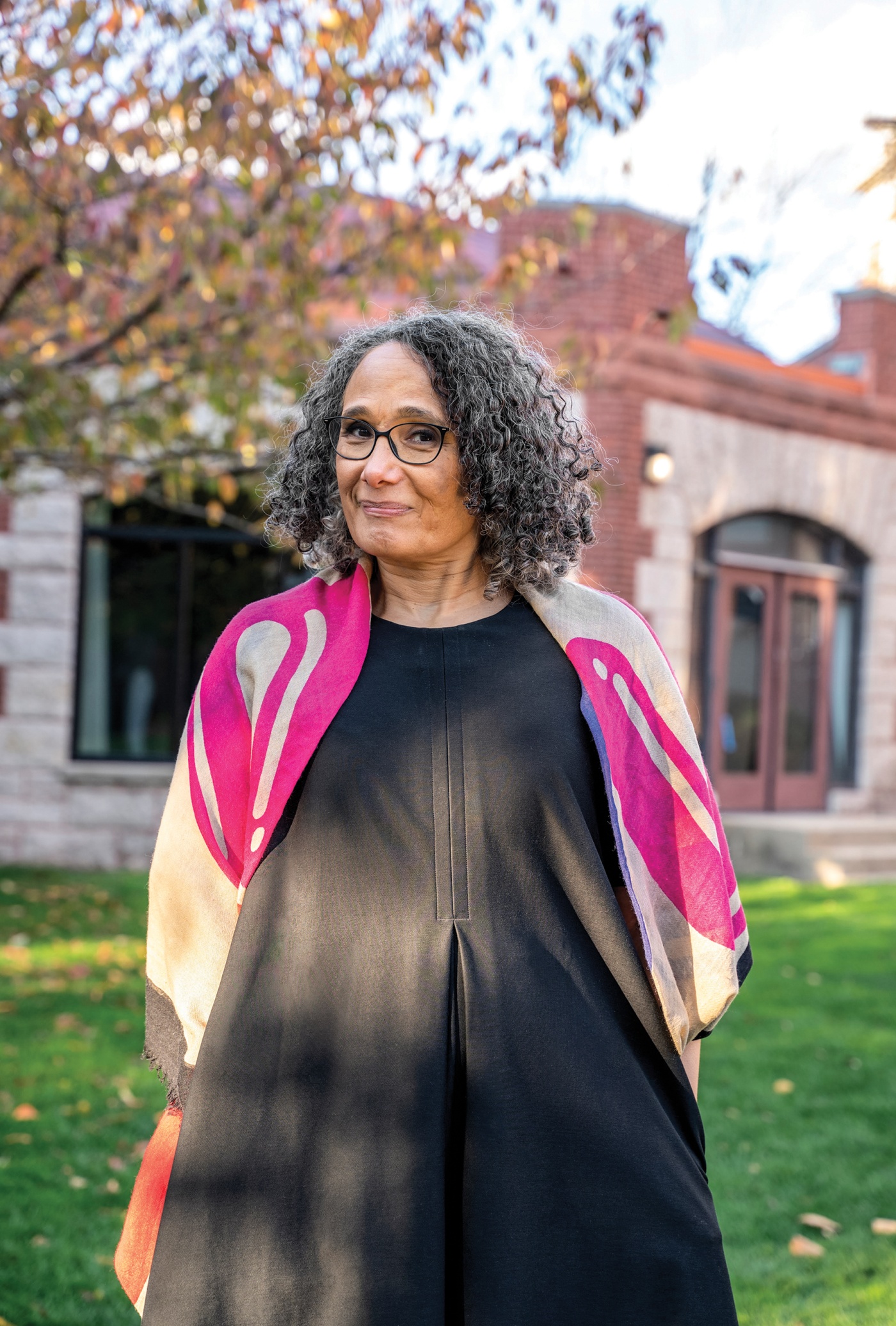
Without skipping a beat, Willis and Rose delve into the “project of Black self-assertion” as it relates to The Souls of Black Folk by W.E.B. Du Bois. Their reflections rapidly generate discussion about the role of Black art in self-assertion, the difference between art and performance, and other threads of conversation that unfurl themselves over video as well as in the chat. As I observe, I am reminded of similar lines of inquiry from my first semester, and a similar bubbling energy that surrounded the hushed side-conversations about the distinction between Black and African American art, scribbled questions in notebook margins about that one particularly complex Du Bois line that we couldn’t quite detangle.
I’m enjoying being sucked back into such lively academic discourse, enjoying the almost-tangible bouncing of questions around the room, planned comments mingled with spontaneous interjection. It is exactly the kind of learning environment I’d hoped to find at Brown. According to students past and present, however, the most powerful element of the course goes beyond traditional pedagogy to mirror a strength of the original Blues People: love, and the ability to model Black love amid—not despite—disagreement.
“Blues People was my favorite class the whole semester, like I actually enjoyed Zoom because of that class,” says Jared Jones ’22. “Along with it being intellectually challenging, it was coupled and supplemented with love and joy.” Those two words, love and joy, undergird everything about the course’s structure, balancing the tartness of impassioned debate with the sweet warmth of genuine community. That semester, the class joined in celebration as one of the TAs got engaged, another brought her baby to class, and Professor Willis surprised Dr. Rose with flowers, just because. Perhaps everyone’s favorite day is the one where Rose and Willis recount their love story to the class (no surprise that it was born out of a rousing academic debate), complete with photographs from their wedding.
It is a rare community that enables students to be both human and scholar, to feel as though through mere conversation, any one of us could be on the brink of discovering something entirely new about the Black body and its closely-surveilled movement through the world.
A bit selfishly, what I remember most fondly from my semester was Professor Rose’s birthday, a sunny day in October when I arrived in class to find a massive box of cupcakes dwarfing Professor Willis’s desk. Lecture was replaced by singing and snacking, and pointed debate swapped out for a free-form conversation where students were permitted to pitch the professors any question we wanted, whether about their research, family life, or anything in between. These classes are exceptionally prominent examples of both professors’ ability to integrate intimacy and academia, but every day held some of that same flavor, rooted in a desire to move from merely discussing community-building to laying down a concrete foundation.
When we think about race, there’s going to be three mistakes we always make, and I hope all of you can put this in your notes somewhere and maybe make it a poster on your wall,” Willis says, now onto a new subject: “Never essentialize, knowing you always will; never romanticize, assuming that’s probably going to happen; and never dogmatize—that is, do not be flat-footed about certain assertions you want to make.”
“Can I add something to that?” Rose interjects, and then after a moment of consideration, adds, “Or are you in a hurry?”
“Nah, go ahead,” Willis responds by way of concession, “I ain’t in no hurry.”
“What’s important is not just to avoid these extremes, but to realize that, ironically, for any group that you are attached to and want the best for, any full measure of their humanity would require that you not essentialize, not romanticize, and not dogmatize,” Rose says, “because the full humanity of who we are is about being able to fully accept the range of human behaviors that we all have.”
“Mmm, that’s good,” Willis responds before rapidly shifting gears. “Now, Professor Rose, we got some questions for you—quickly, ’cause we got to get to the reading. Does Black History Month foster anti-Black racism or undermine it?”
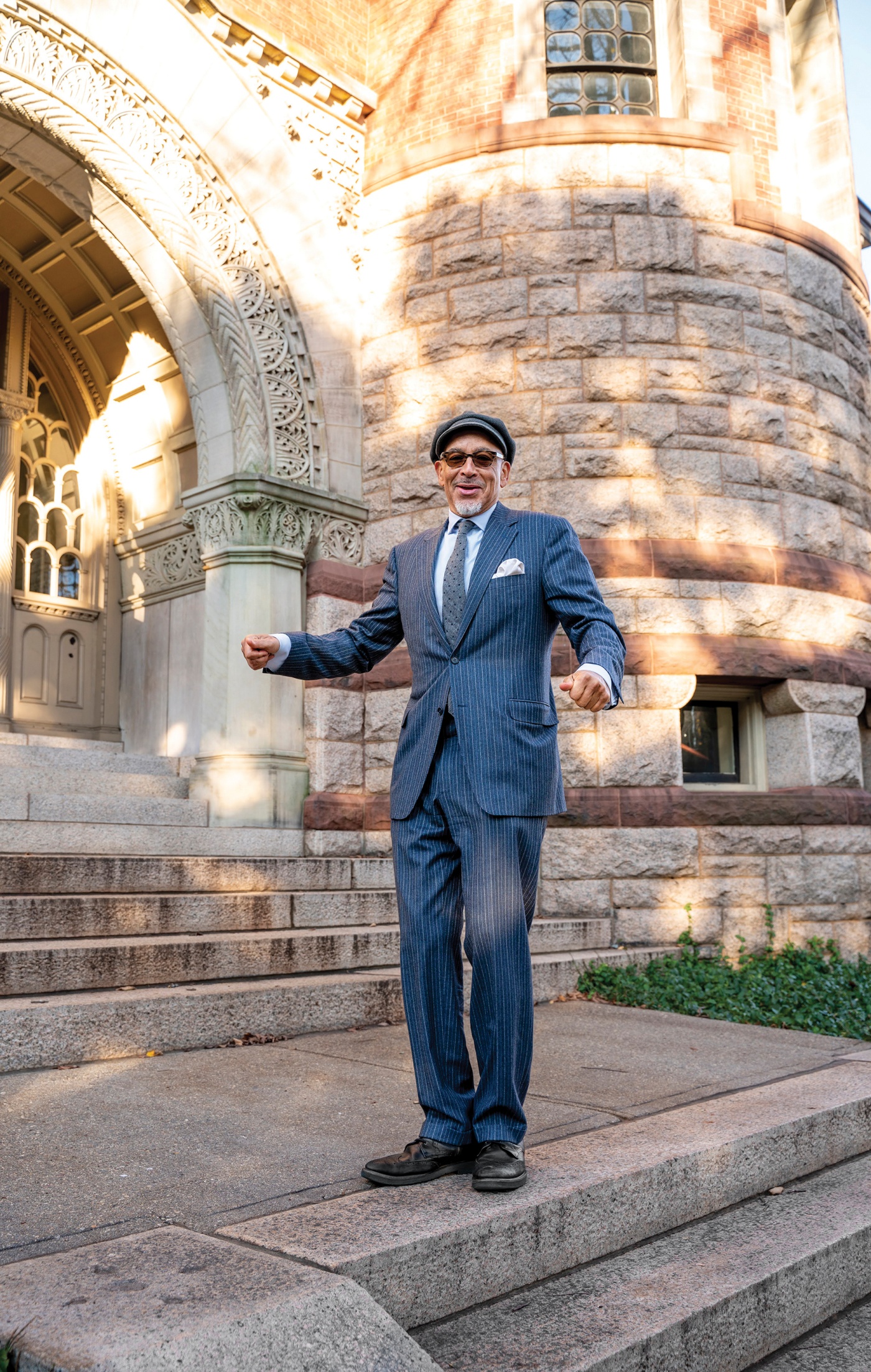
—And would you say that Blackness can exist without whiteness or that Blackness is dependent on whiteness?
—So then, should we separate whiteness from white supremacy? Is that possible?
—And you believe that the kind of philosophical and conceptual messiness that I’m really interested in is quite shortsighted when it comes to the reality of race, right?
Rose fields each of his questions with an organic grace that feels comfortable if not perfectly smooth, lobbing back questions of her own, challenging his assertions, and periodically opening the debate up to the rest of the class before students are sent into their breakout rooms to discuss in greater detail.
Though the structure has shifted slightly from the first year, when introductory lectures were followed by 30 minutes of the professors sparring with one another before the rest of the class joined in open debate for the last half hour, the excitement has remained constant. The discomfort of such weighted questioning feels familiar, as does the ease with which students meet their peers in vulnerability, testifying to personal experiences that hold both beauty and agony. It is a rare community that enables students to be both human and scholar, to feel as though through mere conversation, any one of us could be on the brink of discovering something entirely new about the Black body and its closely-surveilled movement through the world.
“This class has allowed me to think of myself more seriously as a Black writer, as a Black thinker,” says Ede-Osifo, who dreams of being a journalist.
“There’s so much knowledge about Blackness that I don’t have, and I felt very inadequate in that I couldn’t really reference Du Bois, Lorde, and all these Black writers in the same way that people who study these topics for years can,” she reflects. “I always worried about not being able to articulate things in the way I wanted, but I began to see how you can come up with these ideas and questions purely from your feelings and your experiences. There’re always opinions to be had and opinions to be challenged on these issues, and I need to get mine out to the world.”
“Even in their dialogue, I could feel the love that was expressed, and that element of support was something that I didn't really see a lot in Brown academics. And I think that was when I was like, ‘Yo, this is something else. This is what Black love is like.’”
Rose considers a critical element of the class to be these moments of epiphany, moments she remembers longing for during her own college years.
“College is a liminal state between childhood, family, some general sense of a place, and some future that’s really uncertain,” Rose explains, “and I think there’s something reassuring about knowing that there are possible futures that have a long arc and a sense of connection in them.”
And yet, with faithful inevitability, it always seems to come back to love.
“I had a lot of students write to me and say that they really appreciated being able to see the arc of our individual and collective journey, and that was something that surprised me,” Willis says. “But that’s one of the reasons I dig this, because now I know there’s some brothers out there hearing us that are like, ‘Okay, maybe I can shift some of the ways I relate to women,’ or men or any kind of intimate partner they’re trying to have. Like we can add a layer of possibility to their means of connecting.”
For Jones, the shift in his conception of love was subtle but powerful, and continues to shape his relationship to community even after the semester ended.
“I’ve learned the role that support plays in love, especially Black love: It’s a thing that works two ways,” Jones says. “In a lot of ways, Professor Willis supported Professor Rose, and he did so with admiration for her—always showcasing her work and celebrating her. And then Professor Rose, in her own way, supported him.”
“Even in their dialogue, I could feel the love that was expressed, and that element of support was something that up until this year, I didn’t really see a lot in Brown academics. I saw it somewhat within my other kinds of communities, but not to the same degree, and I think that was when I was like, ‘Yo, this is something else. This is what Black love looks like,’” he continues. “Granted, I’m not sure if that was in our notes or anything, but it was that level of support that really hit.”
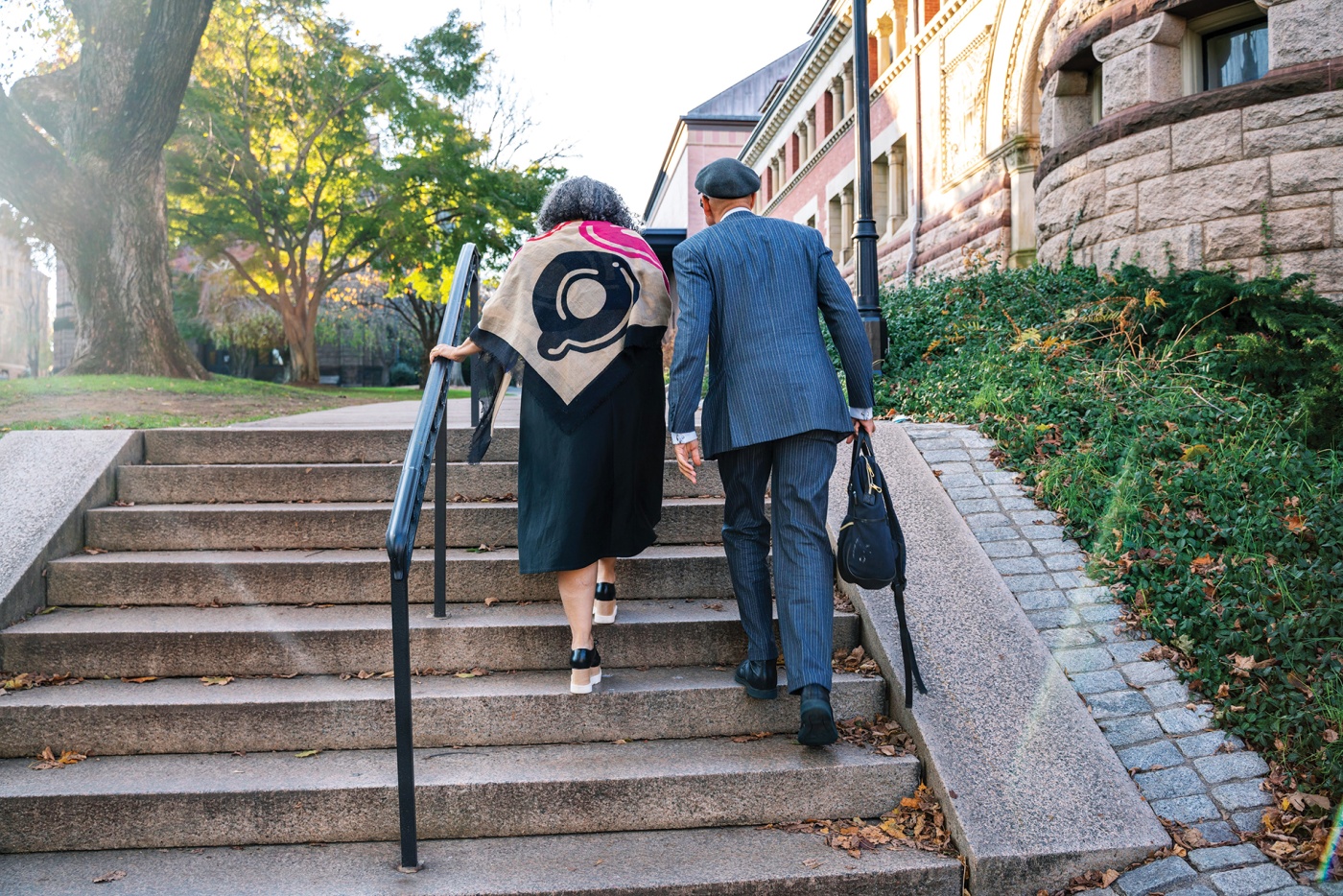
As for myself, I can only share a line from an essay I wrote on November 1, 2017, two months into class. Entitled “The Value of ‘Blues People’ to the Young Black American,” it was never handed in or published anywhere. Rather, it served as a personal archive for my grappling and musing on identity that semester and everything the course enabled me to piece together from those musings. In rereading my rambly, not-yet-developed writing, the words seem nevertheless to belie a truth about the aims and achievements of Blues People that rings true more than four years later:
The virtue of Blues People extends beyond its interdisciplinary approach, impressive in its own right, to craft a space where African American heroes and heroes-to-be feel at home among peers, and comfortable probing a long history of suffering in search of the path to ultimate equality, and of an end to white supremacy through the channels of radical love. On its own, the communication of this message is daunting. However, Dr. Rose and Professor Willis have accepted the additional burden of showing this radical love as they tell it, a testament to the strength of their individual characters, and to their partnership.
“Try to pretend in here, for this hour and a half, that bad things aren’t happening outside,” Tricia Rose said once.
That’s not why we’re here, the room argued silently.
But there is no debate that a safe space for dangerous conversation makes these conversations better, by welcoming candid but intelligent contribution in the rare place where everyone has conceded to being equal(s). It is this freedom of thought and power of reason that Dr. Rose and Professor Willis impart upon their students, in discourse both overt and implied. It is the overwhelming love and the unparalleled virtue of the original Blues People.
Ivy Scott ’21.5, a CASE award-winning former BAM intern, is a criminal justice reporter at the Boston Globe.

